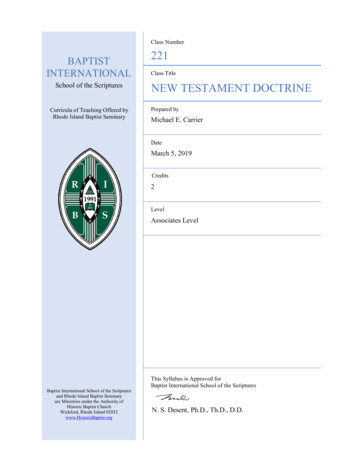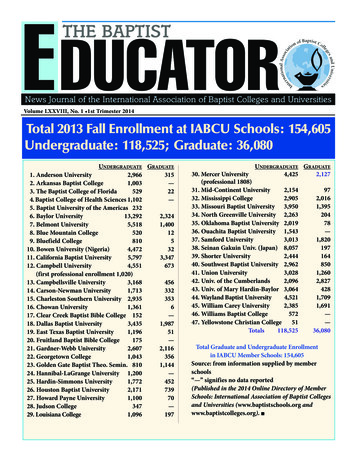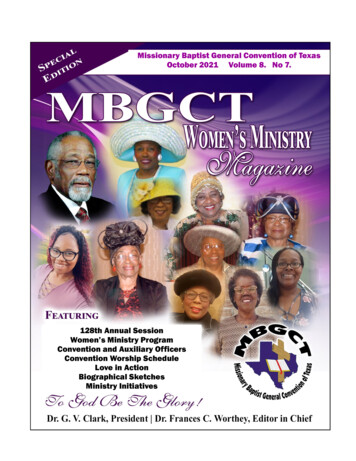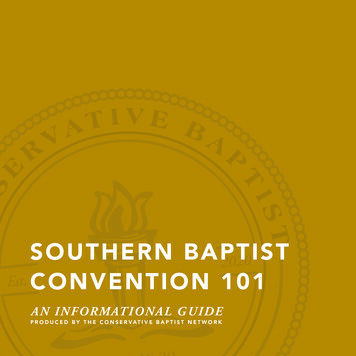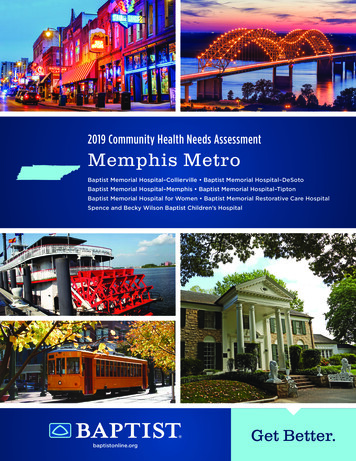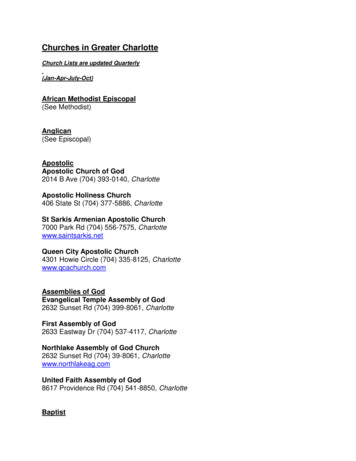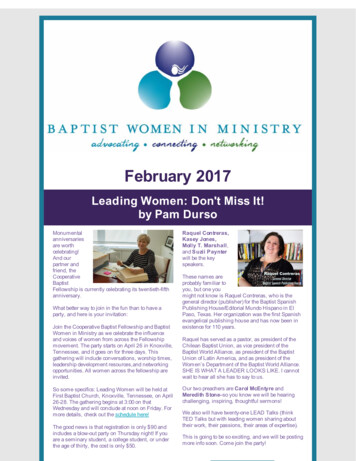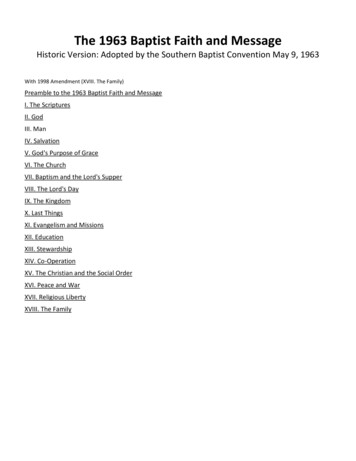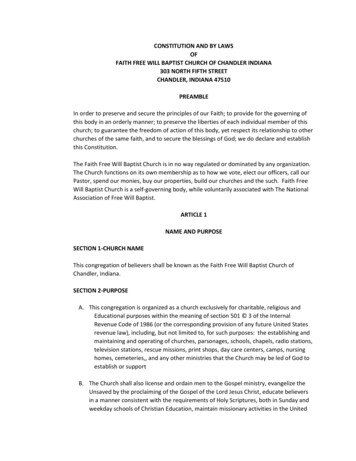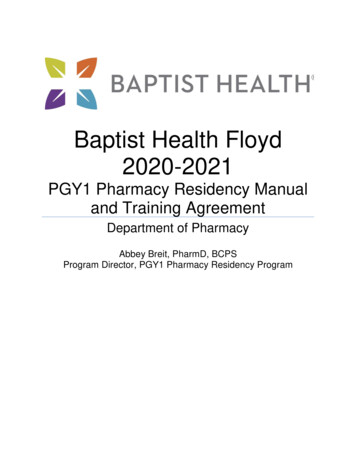
Transcription
Baptist Health Floyd2020-2021PGY1 Pharmacy Residency Manualand Training AgreementDepartment of PharmacyAbbey Breit, PharmD, BCPSProgram Director, PGY1 Pharmacy Residency Program
Baptist Health Floyd – PGY1 Pharmacy Residency Manual and Training AgreementContentsProgram purpose statement . 3Residency personnel. 4Program structure . 5Core rotations . 5Longitudinal rotations . 6Elective rotations . 6Professional Responsibility Component . 8Residency Mentor Program . 8Career Development . 8Learning style and personality type assessments . 8Resident wellness . 9Residency evaluation process.10Residency evaluation scale .12Program completion requirements .13Required activities .13Resident expectations .15Staffing requirements .15Attendance and tardiness .15Duty hours/Moonlighting .15Licensure.15Rotation meetings .16Continuing education .16Disciplinary action .17Resident benefits and leave .18Benefits .18Paid time off (PTO) .18Travel .18Long-term leave of absence .18Statement of Agreement of Terms and Conditions .19Revised 04/25/20202
Baptist Health Floyd – PGY1 Pharmacy Residency Manual and Training AgreementProgram purpose statementAmerican Society of Health-System Pharmacists (ASHP) Postgraduate Year One (PGY1)Pharmacy Residency Program Purpose StatementPGY1 pharmacy residency programs build on Doctor of Pharmacy (PharmD) education andoutcomes to contribute to the development of clinical pharmacists responsible for medicationrelated care of patients with a wide range of conditions, eligible for board certification, andeligible for postgraduate year two (PGY2) pharmacy residency training.Baptist Health Floyd Program DescriptionThe PGY1 Pharmacy Residency Program at Baptist Health Floyd is accredited by ASHP anddesigned to expand on the education provided by a PharmD education and prepare itsgraduates for positions in clinical pharmacy practice or to continue on into specialty residencytraining.The PGY1 residency program is designed to enable the resident to provide progressivepharmacy services in a variety of clinical settings for an acute care regional hospital. Theresident is exposed to many different clinical and professional elements important to currentpractices of clinical pharmacy. Responsibilities include participation in the Pharmacy andTherapeutics committee and the Antimicrobial Stewardship committee meetings and initiatives,precepting students, presenting classroom lectures and conducting valuable research to expandclinical pharmacy services. Resident’s experiences are customized and adapted throughout theyear to allow them to meet their individual goals. Residency preceptors challenge the resident toexcel in a supportive community environment and prepare them to be future leaders in thepharmacy profession.Revised 04/25/20203
Baptist Health Floyd – PGY1 Pharmacy Residency Manual and Training AgreementResidency personnelNameRoleRotation(s) preceptedOrientationDrug Info & Medication SafetyInformaticsAdministration & OperationsDan Inboden, PharmD, MBA, BCPSElizabeth McGinnis, PharmD, BCPSResidency Program DirectorClinical PharmacistInformatics PharmacistDirector of PharmacyStaffing PharmacistPreceptor-in-trainingEmergency Medicine PharmacistPreceptor-in-trainingStaffing PharmacistPreceptor-in-trainingControlled SubstancePharmacistRetail Pharmacy ManagerClinical PharmacistEmily Jones, PharmD, BCPSClinical PharmacistEvan Hampton, PharmD, MBA, BCPSOperations ManagerHayley Ziegler, PharmD, MBA, BCPSClinical PharmacistAmbulatory Care PharmacistLeAnn Doddridge, PharmD, BCPSClinical Pharmacy SupervisorLindsey Minnick, PharmD, BCPS, BCCCPAssociate RPDInfectious Disease Pharmacist,Critical Care PharmacistAdvanced Infectious DiseasesMarina Shcherbakova, PharmD, BCPSEmergency Medicine PharmacistEmergency MedicineSurgical Inpatient ServicesAbbey Breit, PharmD, BCPSBeth Willoughby, PharmD, BCPSBrandon McLain, PharmD, MBA, BCPSCathy Spencer, PharmD, BCPS, AAHIVPCharissa Coulter, PharmD, BCPSCody Johnson, PharmDCory Smith, PharmD, BCPS, CDENatalie Nichols, PharmD, BCPSSarah Hughes, PharmD, BCPS, BCACP, BCCCPClinical PharmacistPreceptor-in-trainingClinical PharmacistCritical Care PharmacistShanna Schneider, PharmD, BCPSInformatics PharmacistShelby Crawhorn, PharmDClinical Pharmacist, Critical CarePharmacistMatt Cavanaugh, PharmD, BCPSRevised 04/25/2020TBDEmergency MedicineStaffingEndocrinologyTBDInfectious DiseasesTeaching & LearningPharmacotherapy & PreceptingStaffingAdministration & OperationsInternal MedicineAmbulatory CareDrug Info & Medication SafetyAdministration & OperationsTBDInternal MedicineCritical CareResearchInformaticsInternal MedicineCritical Care4
Baptist Health Floyd – PGY1 Pharmacy Residency Manual and Training AgreementProgram structureThis residency will design experiences and activities that follow the ASHP learning goals andobjectives for a PGY1 Residency. This community hospital based program will afford theresident an opportunity to rotate through several clinical practice settings at the hospital. Thisprogram consists of a minimum of 12 months of residency training. The RPD and PharmacyManagement are committed to creating staffing schedules that provide the necessarypreceptor/co-preceptor presence during each learning experience to ensure appropriatepreceptor support to the resident.Orientation is the first rotation of the residency year, followed immediately by Internal Medicine.The remaining schedule will be customized based on individual resident needs and goals. Eachresident will select a minimum of four elective rotations. Each resident’s schedule will alsoinclude two 1-week Concentrated Staffing blocks during the Internal Medicine experience andan additional staffing and project block approximately halfway through the residency year.Additional project blocks may be allocated throughout the year at the discretion of the RPD.Core rotations Orientation (4 weeks): The resident will be oriented to Baptist Health Floyd, thePharmacy Department, and active policies, procedures, and processes therein.Additionally, the resident will discuss his/her goals for the following year and scheduleswill be planned to meet these goals. The purpose of this month is ensure the resident isprepared and comfortable working in the in-patient pharmacy and has an understandingof the program expectations for the next year. Internal Medicine (5 weeks): The experience centers around the inpatient pharmacymodel of patient-centered care, with an emphasis on a team-based approach. Coreaspects of the rotation include identification of potential drug therapy problems, designand implementation of patient care plans, monitoring and modification of drug regimens,provision of drug information for both medical and nursing staff, participating in multidisciplinary rounds, medication reconciliation, and medication and discharge counseling. Critical Care (5 weeks): The resident will manage drug therapy for patients in themedical intensive care unit and cardiovascular care unit. Management of these patientsmay include renal dose adjustments, pharmacokinetics, antibiotic management, stressulcer therapy, deep vein thrombosis prophylaxis and other core measures for thecritically ill patients. Fundamental aspects of the rotation include design andimplementation of patient care plans, monitoring and modification of drug regimens,provision of drug information for both the medical and nursing staff, and rounding withthe interdisciplinary team. Infectious Diseases (5 weeks): The resident will function as an independent infectiousdisease consult service that covers patients throughout the hospital. The residentprovides consultation on antimicrobial agent selection, ensuring prompt antimicrobialagent de-escalation, and monitoring of cultures, patient progression, and antimicrobialagent safety and efficacy. Pharmacotherapy & Precepting (5 weeks): This rotation is offered in the last 6 months ofresidency. In this rotation, residents further build on skills developed in the InternalRevised 04/25/20205
Baptist Health Floyd – PGY1 Pharmacy Residency Manual and Training AgreementMedicine rotation while also serving as a preceptor to an Advanced Pharmacy PracticeExperience (APPE) student in a Layered Learning Model.Longitudinal rotations Administration & Operations (12 months): The resident will gain experience with policydevelopment and review, formulary management, organization and departmentstructure, management techniques, human resources, economic rationale and problemsolving, strategic planning, departmental performance improvement efforts, quality andsafety practices, information systems, and budgeting. Drug Information & Medication Safety (12 months): The resident will develop his/herdrug literature evaluation skills; cultivate proficiency in providing comprehensive,unbiased, evidence-based drug information in both oral and written formats; gainexperience with medication error and adverse drug reaction reports; improve themedication use system; and understand the role and value of the pharmacist as a druginformation provider and medication safety expert. Research (12 months): The resident will conduct and oversee an Institutional ReviewBoard (IRB) approved research project to completion. By the end of this experience, theresident will have the skills necessary to complete a health outcomes research projectfrom study design to data analysis and manuscript preparation and submission. Staffing (12 months): The resident will develop foundational practice skills in hospitalpharmacy practice. The resident will hone their prioritization and multi-tasking skills asthey manage the daily activities in central pharmacy and in decentralized roles. Activitiesinclude, but are not limited to, verifying patient-specific medication orders, providingpharmacokinetic or other clinical consult services upon request, answering in-depth druginformation questions, providing patient education, supervising technician staff, checkingsterile and nonsterile compounding, and solving pharmacotherapy related issues. Teaching & Learning (12 months): The resident will develop and refine teaching skillsthrough the completion of a teaching curriculum sponsored by Sullivan UniversityCollege of Pharmacy (SUCOP). In addition to meeting the requirements of the teachingcurriculum, residents will be challenged to create a diverse teaching portfolio throughoutthe course of residency year that highlights numerous teaching experiences and skillsutilized to educate to a wide variety of audiences. Upon successful completion of theteaching curriculum residents will received a certificate of achievement for the program.Elective rotations Advanced Infectious Diseases (5 weeks): The rotation is designed to further develop theknowledge base, competencies, and clinical skills for the treatment of infectiousdiseases that the resident pharmacist gained during the Infectious Diseases rotation.The resident will round with the infectious diseases (ID) team and will be exposed todirect patient interaction. During this learning resident will also learn how to work withinthe hospital system by leading and attending ID related meetings at a local and hospitalsystem level. Ambulatory Care (5 weeks): The resident will work in the Pharmacy Services OutpatientClinic and will focus mainly on anticoagulation therapy management, as well asRevised 04/25/20206
Baptist Health Floyd – PGY1 Pharmacy Residency Manual and Training Agreement patient/caregiver communication and education. Utilizing a collaborative practiceagreement with multiple different providers, the resident will ensure proper therapy on apatient-by-patient basis and will gain skills as a preceptor while working with APPEstudents that are on rotation in the clinic.Emergency Medicine (5 weeks): Residents will encounter a uniquely diverse patientpopulation and be exposed to a wide variety of disease states that range from long-termdisease state management to the acute management of critically ill patients requiring animmediate and high level of care. Activities may include patient interviewing andcounseling; answering drug information questions and providing evidence-basedpharmacotherapy recommendations; participating in cardiopulmonary resuscitations,responding to Code Stroke and Code 4 alerts, supervising pharmacy technician-ledmedication reconciliation services, and managing the outpatient discharge cultureservice.Endocrinology (5 weeks): The resident will work within the patient-centered care modelfor inpatient care, with various healthcare professionals including the endocrinologists ofJoslin Diabetes Center for both inpatient and outpatient care, and optionally attendCamp Hendon, a diabetes camp for children. Core aspects of the rotation include designand implementation of patient care plans, monitoring and modification of drug therapyregimens, provision of drug information for medical and nursing staff, and provision ofboth inpatient and outpatient patient education.Informatics (4 weeks): The resident will work on a multi-disciplinary team with pharmacy,nursing, and information technology (IT) leadership to help make workflow and processdecisions. The goal of this rotation is for the resident to develop the necessary skills toidentify challenges and opportunities for improvement in our clinical information systems.Surgical Inpatient Services (5 weeks): The pharmacy resident will be responsible foroverseeing and managing medication therapy for patients on the surgical inpatient unit(SIPS) from admission to transfer/discharge. Core aspects of the rotation includeidentification of proper pre- and post-operative antibiotics, identification of proper postoperative thromboembolism prophylaxis, identification of potential drug therapyproblems, design and implementation of patient care plans, monitoring and modificationof drug regimens, provision of drug information for both medical and nursing staff,participating in multi-disciplinary rounds, medication reconciliation, and medication anddischarge counseling.Revised 04/25/20207
Baptist Health Floyd – PGY1 Pharmacy Residency Manual and Training AgreementProfessional Responsibility ComponentThe BHF PGY1 Pharmacy Residency Program affirms that the program and preceptors have aresponsibility to provide its residents with professional support beyond the educational andexperiential training received via learning experiences. As such, the program has developedseveral components aimed at enabling residents to achieve their immediate post-residencygoals, adapt to ever-evolving pharmacist roles and healthcare environment, and achieve careerlong professional and personal success.Residency Mentor Program Residents must select a residency mentor by the end of their orientation experience.They may choose any active residency preceptor who has been a preceptor within theprogram for at least one year. Mentor expectations:o Meet with mentee to review progress at least monthly for the first 3 months, withat least one of these meetings taking place off-site. Meet no less than quarterlythereafter.o Meet with the RPD quarterly to complete the mentee’s development plan.o Attend as many of the mentee’s presentations as possible.o Provide career guidance (goal setting, CV review at least quarterly, interviewprep, etc.).o Provide general guidance and support to the mentee Support mentee in pursuit of personal/professional balance anddevelopment of time management. Serve as a sounding board for mentee problems and frustrations.o Serve as an advocate for the mentee and his/her success.o Provide mentee-specific details and perspective to RAC and RPD, includingkeeping the RPD apprised of any difficulties the mentee may be experiencing.Career Development The program will offer educational career development workshops throughout the yearto prepare the resident to obtain an employment position at the completion of theirresidency. Topics may include but are not limited to CV development, letter of intentdevelopment, preparation for Pharmacy Placement Services (PPS) at Midyear, and jobinterview preparation.Learning style and personality type assessments The resident will complete learning style and personality type assessments as assignedprior to or shortly after entrance into the program. These results will be shared withpreceptors to enable them to better customize residents’ experiences. Preceptorlearning style and personality type assessments will also be shared with residents andother preceptors.Revised 04/25/20208
Baptist Health Floyd – PGY1 Pharmacy Residency Manual and Training AgreementResident wellness During Orientation, the RPD will introduce the resident to the Employee AssistanceProgram (EAP) and concepts surrounding burnout, well-being, and emotionalintelligence. Throughout the year, the RPD or designee will coordinate further educationon these and related topics. The Residency Social Committee will coordinate periodic Residency Outings forresidents and preceptors throughout the year. These events are an opportunity to furtherdevelop resident and preceptors relationships and facilitate a healthier life-workharmony.Revised 04/25/20209
Baptist Health Floyd – PGY1 Pharmacy Residency Manual and Training AgreementResidency evaluation processPreceptors will provide frequent and timely verbal and/or written feedback to the resident ontheir performance and progress throughout the year. In addition to this continual informalfeedback, preceptors will complete formal evaluations at scheduled intervals and as neededusing PharmAcademic. Preceptors must discuss formal evaluations in-person with the resident. All evaluations must be completed within seven (7) days of the assigned due datein PharmAcademic, except for resident midpoint evaluations which should becompleted within three (3) business days of the assigned due date.All PharmAcademic evaluations should be completed prior to meeting to discuss themResidents are responsible for scheduling all meetings with preceptors to completeevaluations in a timely manner.Resident self-assessmentso Residents are expected to practice continual self-reflection and self-assessment.o For each core and elective rotation, the resident will complete the midpoint selfassessment in PharmAcademic approximately halfway through the rotation. Thepreceptor will verbally provide the resident with generalized feedback on theirperformance and respond to the resident’s midpoint self-assessment.o The same is done on a quarterly basis for all longitudinal rotations.Resident's evaluation of preceptor and learning experienceo Each resident will complete an evaluation of the preceptor and learningexperience at the end of each rotation.o The same must also be done at the end of the first quarter for longitudinalrotations.Preceptor's evaluation of resident's rotation performance (summative evaluation)o For all rotations, the primary preceptor will complete a summative, criteria-basedevaluation of the resident in PharmAcademic at the end of the rotation.o For longitudinal rotations, this must also be performed at least once per quarter.Formative evaluationso Each preceptor should provide periodic opportunities for the residents to receiveand/or practice criteria-based formative evaluation on aspects of their routineperformance. Examples of formative evaluations include, but are not limited towritten feedback on patient care notes, written feedback on project drafts, andfeedback on in-services/presentations. When completed, the resident/preceptorwill submit the evaluation via PharmAcademic and/or file it in their residencyportfolio.Quarterly resident self- and program-assessmento On a quarterly basis, each resident will perform an independent self- andprogram-assessment via a pre-built PharmAcademic evaluation.o Resident input will be used to improve the resident’s individual experience andresidency program in general.Resident development planRevised 04/25/202010
Baptist Health Floyd – PGY1 Pharmacy Residency Manual and Training AgreementooooooResidents will complete a self-assessment at the beginning of the residency yearusing the ASHP Entering Interests Form and Entering Objective-Based SelfEvaluation in PharmAcademic. These evaluations should be complete prior tothe resident’s first day of his/her Orientation learning experience or as assignedby the RPD, and will be discussed during the first quarterly development planreview with the RPD.Upon entry, the RPD and preceptors will customize the training program for theresident based upon an assessment of the resident’s entering knowledge, skills,attitudes, and abilities and the resident’s interests.The resident’s development plan will be reviewed and updated quarterly. TheRPD will evaluate the resident based upon the resident's progress towardachieving the criteria-based residency program goals and objectives;individualized goals established by the resident, RPD, and residency mentor; andoverall resident performance. The RPD is ultimately responsible but maydelegate the evaluation process to a preceptor.There must be at least, but not limited to, three goals included in the resident’sdevelopment plan. Goals should be specific and have a plan that includesactivities that will be used to accomplish resident goals.The resident, RPD, and residency mentor must sign the development plan. Thedevelopment plan will be shared with all preceptors.At each Residency Advisory Committee (RAC) meeting, progression towardachievement for residency for the specific goals and objectives related to thecurrent learning experience will be discussed. Input and feedback will beprovided to facilitate hand-off for the next learning experience and modificationsto the developmental plan will take place as necessary.Revised 04/25/202011
Baptist Health Floyd – PGY1 Pharmacy Residency Manual and Training AgreementResidency evaluation scaleThe following rubric will be used to assess resident progress toward satisfactorily achievingobjectives: Needs Improvement (NI)o Significant improvement is needed. Resident’s skills not progressing asexpected, knowledge base may be lacking, resident shows little or no motivationto grow professionally, or preceptor must provide extensive or consistentprompting to facilitate completion. Resident’s current progress will not result inachievement of objective.o Preceptors must provide comments on objectives scored “NI” in summativeevaluations.Satisfactory Progress (SP)o Resident is progressing at rate expected for new practitioner with minimalexperience (performs within expectations with minimal supervision). Residentdoes not consistently meet, or requires occasional prompting to complete theobjective. Resident would benefit from additional learning experience. Resident’sprogress is expected to result in achievement of objective.Achieved (ACH)o Resident is consistently practicing at level of experienced practitioner in thisparticular scope of practice. The resident demonstrates confidence, efficiency,and proficiency at meeting the objective. Requires no prompting to meetexpectations and would be capable of precepting students on this objective asexecuted. Resident’s progress is expected to result in achievement of objectivefor the residency.o Preceptor must provide comments supporting their decision to score an objective“ACH”, unless the objective has already been scored ACHR. (For longitudinalrotations, this is only required for the first time an objective has been scored“ACH”.)Achieved for Residency (ACHR)o Resident consistently performs objective at the ACH level, as defined above,across the scope of pharmacy practice. No further instruction or evaluation isrequired. Documentation of a resident's achievement of a goal/objective for theresidency program will be the responsibility of the RPD.Revised 04/25/202012
Baptist Health Floyd – PGY1 Pharmacy Residency Manual and Training AgreementProgram completion requirementsResidents are expected to complete all required activities and satisfactorily receive “Achievedfor Residency” for at least 80% objectives of the program with no active “Needs Improvement”.Only those residents who satisfactorily complete the requirements will receive their ResidencyCertificate as evidence of program completion. Evaluation of the resident's progress incompleting the requirements is done as part of the quarterly review process. The resident andpreceptor(s), in conjunction with the RPD, shall assess the ability of the resident to meet therequirements by established deadlines and work with the resident to assure their satisfactorycompletion. Upon successful completion of the program, a resident graduation ceremony will beheld where the resident shall receive the residency program graduation certificate.Required activities Successful completion of Basic Life Support (BLS) and Advanced Cardiac Life Support(ACLS) curriculumo Each resident is expected to successfully complete the BLS training prior to theend of their Orientation experience.o ACLS must be successfully completed within 3 months of starting residency. Completion of residency research projecto The resident must select a longitudinal research project to be completed duringthe residency year. The resident will be responsible for managing the projectdetails such as IRB approval, study design, endpoints, data collection andanalysis with support from the research preceptor, mentor and researchcommittee. Poster presentation at the ASHP Midyear Clinical Meetingo Each resident will present a poster at the annual ASHP Midyear Clinical Meeting.The poster will describe their research project design. Presentation at Great Lakes Pharmacy Residency Conferenceo Each resident will make a presentation on their research project, which will beevaluated by preceptors and residents attending the conference. The residentwill participate in a practice session with preceptors prior to Great LakesResidency Conference attendance. Submission of a manuscript to a peer-reviewed journalo All residents must write a manuscript suitable for publication and submit to apeer-reviewed biomedical journal for consideration for publication. Themanuscript must be a report of the PGY1 resident’s practice-related researchproject. Editorial assistance by a preceptor is required. The resident must be firstauthor and be responsible for submission and revisions to a journal. Continuing Education Presentationo Each resident will deliver a presentation approved for continuing education creditfor healthcare professionals. Completion of four journal club presentationsRevised 04/25/202013
Baptist Health Floyd – PGY1 Pharmacy Residency Manual and Training Agreemento Residents will present a current journal article review at least once a quarter. Aminimum of three of these must be presented at the weekly departmental RoundTable.Compl
Evan Hampton, PharmD, MBA, BCPS Operations Manager Staffing Administration & Operations Hayley Ziegler, PharmD, MBA, BCPS Clinical Pharmacist Ambulatory Care Pharmacist . through the completion of a teaching curriculum sponsored by Sullivan University College of Pharmacy (SUCOP). In addition to meeting the requirements of the teaching
